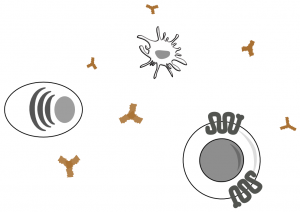Training Opportunities
 The Pediatric Multiple Sclerosis and Neuroimmunology training program is a Texas Medical Board-approved fellowship that offers post-residency training in immune-mediated diseases of the central nervous system. The program emphasizes a comprehensive approach to patient care, clinical and basic research, education, and management of adult and pediatric patients with multiple sclerosis and related disorders.
The Pediatric Multiple Sclerosis and Neuroimmunology training program is a Texas Medical Board-approved fellowship that offers post-residency training in immune-mediated diseases of the central nervous system. The program emphasizes a comprehensive approach to patient care, clinical and basic research, education, and management of adult and pediatric patients with multiple sclerosis and related disorders.
Those who have successfully completed residency training in adult or child neurology, and are board-eligible or board certified by the American Board of Psychiatry and Neurology are eligible to apply.
Goals and Objectives
Year 1
- To develop competence in the diagnosis, management, and care of patients with multiple sclerosis and related immune-mediated disorders using the most up-to-date clinical protocols and cutting-edge imaging techniques. In addition, the fellows will manage pediatric patients with multiple sclerosis and related disorders in the outpatient clinic.
- To incorporate personalized therapy and risk management into clinical decision making in the care of adult and pediatric patients with demyelinating diseases of the central nervous system, including multiple sclerosis, neuromyelitis optica spectrum disorder (NMOSD), acute disseminated encephalomyelitis (ADEM), MOG antibody-associated disease, optic neuritis, transverse myelitis, etc.
- To develop a comprehensive knowledge of patient-centered outcomes in clinical and translational research and its potential application to the field of Neuroimmunology/MS.
- To develop competence in effectively coordinating patient care with the various participating subspecialties including rehabilitative medicine, physical and occupational therapy, neuropsychology, neurosurgery, psychiatry, neuro-ophthalmology, etc.
Year 2 (optional)
- To apply experience in basic and applied immunological techniques used in the study of animal models of organ-specific autoimmunity and immune deviations in humans with multiple sclerosis, as well as in the advanced imaging of multiple sclerosis subjects or animal models of the disease.
- To design, conduct, and analyze clinical trials in multiple sclerosis.
The fellowship assumes a minimum of 1 and maximum of 2 years of training. A second year of fellowship depends on the applicant’s clinical and research interests, long-term career goals, and successful completion of the first year of the fellowship program.
Clinical and Basic Science Research
Fellows will actively participate in sponsored clinical trials conducted in the University Clinical Research Center at Memorial Hermann Hospital. Involvement with clinical patients will extend to patients who are admitted to the hospital, and actively managed on an outpatient basis in the clinic or at home with the help of visiting nurse teams. Fellows will also engage in subspecialty consultations and provide appropriate recommendations for the inpatient adult and child Neurology teams under the supervision of an attending who specializes in multiple sclerosis.
The Multiple Sclerosis Research Group consists of three faculty members, a full-time nurse coordinator, and two medical assistants who are well experienced in the management of patients with multiple sclerosis and the conduct of clinical trials. Direct involvement in the clinical management of patients with multiple sclerosis will constitute 50-60% of the fellow’s active time in the program. The remaining time will be devoted to the development of clinical research skills applicable to the study of patients with multiple sclerosis and related disorders under direct supervision of the Multiple Sclerosis Research Group faculty.
Evaluation
Fellows are evaluated monthly by faculty members who specialize in multiple sclerosis. Successful completion of the fellowship program is based upon the performance of the fellow throughout the fellowship and will be determined prior to the end date of the program.